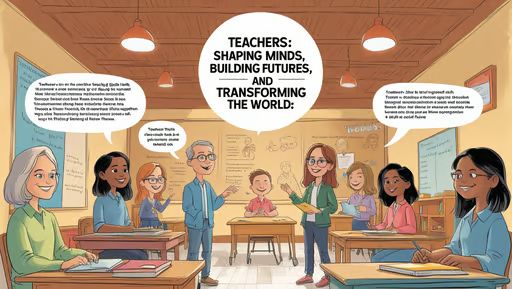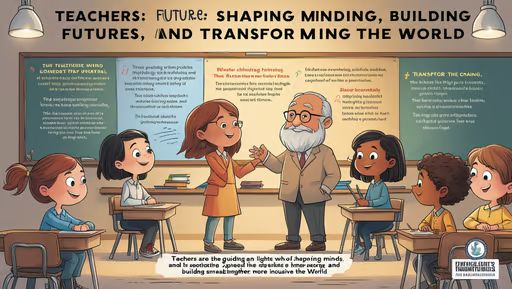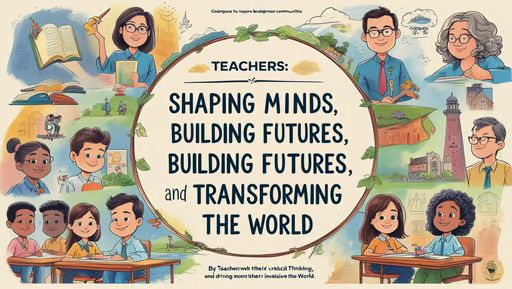Teachers Make the World a Better Place, Education is the cornerstone of human progress, and teachers are the architects who lay its foundation. They are the unsung heroes who shape minds, inspire dreams, and ignite the spark of curiosity that drives innovation and progress. In a world that is constantly evolving, teachers remain a constant force for good, guiding individuals and societies toward a brighter future. Their role extends far beyond the classroom, as they instill values, foster critical thinking, and empower individuals to contribute meaningfully to the world. This article explores how teachers make the world a better place, highlighting their impact on individuals, communities, and society as a whole.
The Role of Teachers in Shaping Individuals
Teachers play a pivotal role in shaping the lives of individuals. From the moment a child steps into a classroom, teachers become their mentors, guides, and role models. They are not just imparting knowledge; they are helping students discover their potential, build confidence, and develop a sense of purpose. A good teacher can inspire a lifelong love of learning, encouraging students to explore new ideas and pursue their passions.
One of the most profound ways teachers impact individuals is by fostering critical thinking and problem-solving skills. In an era of information overload, the ability to analyze, evaluate, and synthesize information is more important than ever. Teachers equip students with the tools to navigate complex issues, question assumptions, and make informed decisions. These skills are essential for personal growth and success in an increasingly interconnected world.
Moreover, teachers often serve as a source of emotional support for their students. Many children face challenges outside the classroom, such as family issues, poverty, or mental health struggles. Teachers are often the first to notice when something is wrong and can provide a safe space for students to express themselves. By showing empathy and understanding, teachers help students build resilience and develop the emotional intelligence needed to navigate life’s ups and downs.
Teachers as Agents of Social Change
Teachers are not just educators; they are also agents of social change. Throughout history, teachers have played a crucial role in challenging societal norms, promoting equality, and advocating for justice. From the civil rights movement to the fight for gender equality, teachers have been at the forefront of efforts to create a more just and equitable world.
In many parts of the world, teachers are working to break the cycle of poverty by providing quality education to underserved communities. They are often the only hope for children who would otherwise be denied the opportunity to learn and grow. By empowering these children with knowledge and skills, teachers are helping to create a more inclusive society where everyone has the chance to succeed.
Teachers also play a vital role in promoting tolerance and understanding in an increasingly diverse world. In multicultural classrooms, teachers help students appreciate different perspectives, cultures, and traditions. By fostering a sense of global citizenship, teachers are preparing students to live and work in a world that is more interconnected than ever before.

The Ripple Effect of Teachers on Communities
The impact of teachers extends far beyond the individual students they teach. When teachers inspire and empower their students, they create a ripple effect that benefits entire communities. Educated individuals are more likely to contribute to their communities, whether through volunteering, civic engagement, or economic participation. They are also more likely to raise educated children, creating a cycle of positive change that spans generations.
Teachers also contribute to the social and economic development of their communities. In many rural and underserved areas, schools are the heart of the community, providing not just education but also a sense of hope and possibility. Teachers in these areas often go above and beyond their duties, organizing community events, providing mentorship, and advocating for resources to improve the quality of life for everyone.
Furthermore, teachers are often the first to identify and address social issues within their communities. Whether it’s advocating for better healthcare, promoting environmental sustainability, or addressing issues of inequality, teachers are often at the forefront of efforts to create positive change. Their unique position as trusted members of the community allows them to mobilize others and drive collective action.
Teachers and the Global Impact of Education
On a global scale, teachers are instrumental in addressing some of the world’s most pressing challenges. Education is a key driver of economic growth, social development, and environmental sustainability. By equipping individuals with the knowledge and skills needed to tackle these challenges, teachers are helping to create a more sustainable and equitable world.
For example, teachers play a critical role in promoting environmental awareness and sustainability. Through lessons on climate change, conservation, and renewable energy, teachers are preparing the next generation to take action to protect the planet. They are also instilling values of responsibility and stewardship, encouraging students to think about the long-term impact of their actions.
Teachers are also essential in the fight against global poverty and inequality. Education is one of the most effective tools for breaking the cycle of poverty, and teachers are the ones who make this possible. By providing quality education to children in disadvantaged communities, teachers are helping to create a more equitable world where everyone has the opportunity to thrive.
The Challenges Teachers Face
Despite their immense contributions, teachers often face significant challenges in their work. Many teachers work in underfunded schools with limited resources, making it difficult to provide the quality education their students deserve. In some parts of the world, teachers face threats to their safety and well-being, particularly in areas affected by conflict or political instability.
Teachers also often struggle with low pay and lack of recognition for their work. Despite the critical role they play in society, teaching is often undervalued, and teachers are not always given the respect and support they deserve. This can lead to burnout and high turnover rates, which ultimately harm students and communities.
Addressing these challenges requires a collective effort from governments, communities, and individuals. Investing in education and supporting teachers must be a top priority if we are to create a better world for future generations.

How We Can Support Teachers
There are many ways we can support teachers and ensure they have the resources and recognition they need to succeed. Governments must prioritize education funding, ensuring that schools have the resources they need to provide quality education. This includes investing in teacher training, providing competitive salaries, and creating safe and supportive working environments.
Communities can also play a role by recognizing and celebrating the contributions of teachers. Simple gestures, such as expressing gratitude or volunteering at local schools, can go a long way in showing teachers that their work is valued. Parents can support teachers by being actively involved in their children’s education and advocating for policies that benefit schools and teachers.
Individuals can also make a difference by supporting organizations that work to improve education and support teachers. Whether through donations, volunteering, or advocacy, everyone can contribute to creating a world where teachers have the resources and recognition they need to succeed.
Conclusion
Teachers are the unsung heroes who make the world a better place. Through their dedication, passion, and commitment, they shape the lives of individuals, drive social change, and contribute to the development of communities and societies. Their impact is felt not just in the classroom but in every aspect of life, from the economy to the environment.
As we navigate the challenges of the 21st century, the role of teachers has never been more important. They are the ones who will prepare the next generation to tackle the complex issues facing our world, from climate change to social inequality. By supporting and empowering teachers, we can create a brighter future for everyone.
In the words of Henry Brooks Adams, “A teacher affects eternity; he can never tell where his influence stops.” Teachers truly make the world a better place, and their legacy will continue to inspire and transform lives for generations to come.

9 thoughts on “Teachers Make the World a Better Place”
Comments are closed.